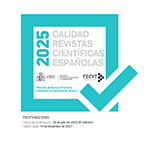Truth as Literature: Ethics of Journalism and Reality in the Digital Society
Abstract
Modern journalism emerged in the XIX century based on truth and reality. The rise of Romanticism in that century proposed an approach against the Enlightenment and its pillars: objectivity, positivism and realism. Unlike it, Romanticism claimed subjectivity and the self as the more authentic reality. Thus, it took beauty out of the base of aesthetics and put in its place communication and expression. With the arrival of Postmodernism, the notions of reality and truth have been in crisis too and so it proposes a moral and epistemological relativism. This view has been a permanent attack on journalism. This paper vindicates reality and truth, and so journalism as one of the main institutions based on those concepts, besides science. Therefore, journalism can be seen as the most necessary and genuine aesthetic in the current digital era because it takes and melts objectivity and realism from Illustration, communication and subjectivity from Romanticism, and impact from Postmodernism. In current network societies, journalism has rehabilitated a new narrative and is increasingly more based on stories than on news. That is creating a genuine literature of reality, which gathers both the ethic and the aesthetic project of the Enlightenment, Romanticism and Postmodernism.
Downloads
Article download
License
In order to support the global exchange of knowledge, the journal Estudios sobre el Mensaje Periodístico is allowing unrestricted access to its content as from its publication in this electronic edition, and as such it is an open-access journal. The originals published in this journal are the property of the Complutense University of Madrid and any reproduction thereof in full or in part must cite the source. All content is distributed under a Creative Commons Attribution 4.0 use and distribution licence (CC BY 4.0). This circumstance must be expressly stated in these terms where necessary. You can view the summary and the complete legal text of the licence.










